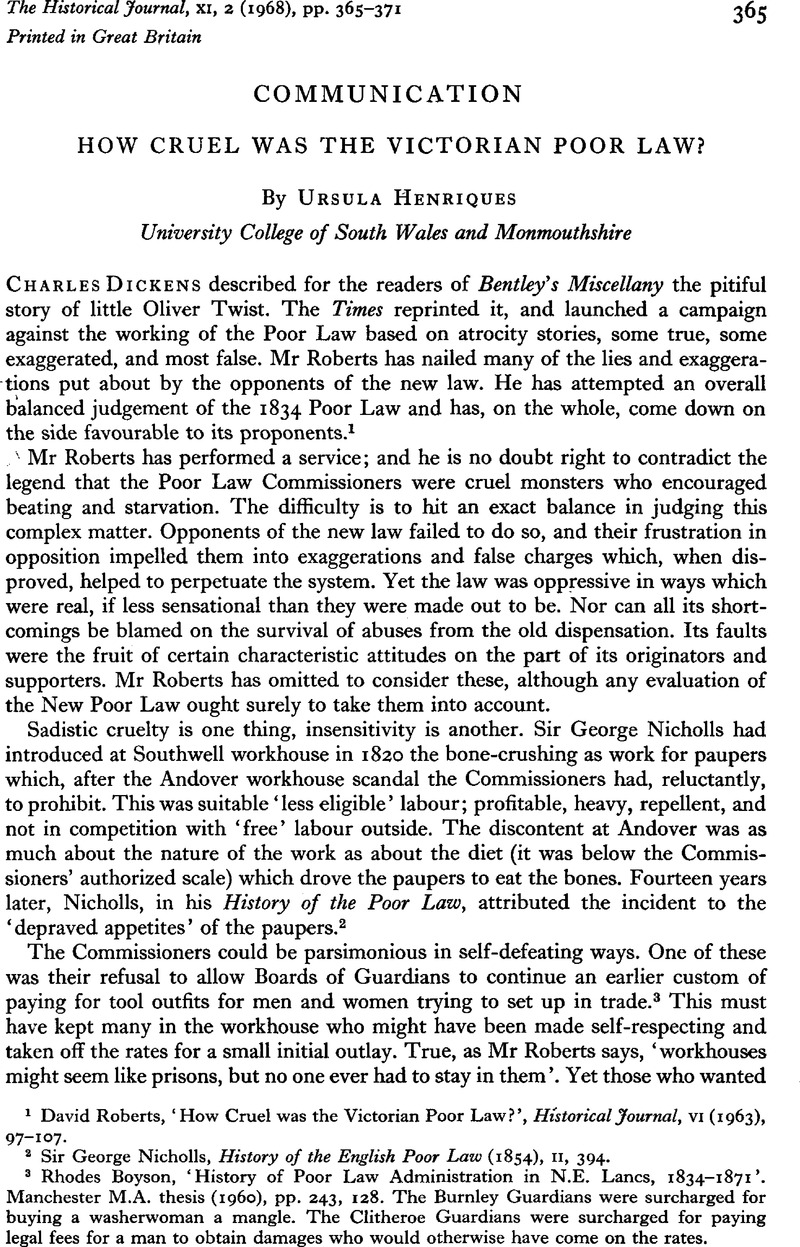Published online by Cambridge University Press: 11 February 2009

1 Roberts, David, ‘How Cruel was the Victorian Poor Law?’, Historical Journal, vi (1963), 97–107.CrossRefGoogle Scholar
2 Nicholls, Sir George, History of the English Poor Law (1854), II, 394.Google Scholar
3 Boyson, Rhodes, ‘History of Poor Law Administration in Lanes, N.E., 1834–1871’. Manchester M.A. thesis (1960), pp. 243, 128. The Burnley Guardians were surcharged for buying a washerwoman a mangle. The Clitheroe Guardians were surcharged for paying legal fees for a man to obtain damages who would otherwise have come on the rates.Google Scholar
4 Jones, Tydfil Davies, ‘Poor Law and Public Health Administration in the Area of Merthyr Tydfil Union, 1834–1894’. Cardiff M.A. thesis (1961), p. 287. Eventually the Guardians gave leavers a supply of bread and cheese.Google Scholar
6 Evidence of John Napper, Chairman of Petworth Board of Guardians. First Report from the Select Committee on the Poor Law Amendment Act. Pari. Pap. (1837), XVII, i, p. 57. In the Medway Union the children were allowed a Christmas dinner, not, of course, on the rates.Google Scholar
6 Report on Further Amendment of the Poor Law (1839), p. 56. Of 97,510 workhouse inmates 42,767 were children.Google Scholar
7 This was considered one way of deterring idle applicants.
8 Evidence of Rev. Thomas Sockett, Rector of Petworth. First Report etc. Pari. Pap. (1837), XVII, i, pp. 24–5.Google Scholar
9 ‘…the refusal of the workhouse under such circumstances by the aged and infirm person, the refusal of this very careful provision and attendance, may be compared to the refusal of an abode in a well-arranged hospital by a sick or lame person.’ Twenty-first Report from the Select Committee etc. Pari. Pap. (1837), XVII, ii, p. 506.Google Scholar
10 Third Annual Report of the Poor Law Commissioners (1837), p. 45.Google Scholar Cf. Blaug, Mark, ‘The Poor Law Re-examined’, Journal of Economic History, xxiv (1964), 229–45. Dr Blaug has pointed out that the Commissioners of Inquiry in 1834 deliberately confused allowances in aid of wages with a much older system of children's allowances, in order to persuade an anti-‘Speenhamland’ public to support the withdrawal of both.CrossRefGoogle Scholar
11 E.g. Second Annual Report of the Poor Law Commissioners (1836) p. 30.Google Scholar
12 Ibid. Appendix D, pp. 566–8.
13 Return of Number of Orders of Affiliation etc. Pari. Pap. (1837–1838), XXXVII, 413–30.Google Scholar Cf. Henriques, U., ‘Bastardy and The New Poor Law’, Past and Present, 37 (07 1967), 121.CrossRefGoogle Scholar
14 First Annual Report of the Poor Law Commissioners (1835) pp. 31–5.Google Scholar
15 Second Annual Report of the Poor Law Commissioners (1836) p. 6.Google Scholar
16 Report from H.M. Commissioners for Inquiring into the Administration and Practical Operation of the Poor Laws (1834), p. 74.Google Scholar
17 Brooks, D. C., ‘The Poor in the Medway Towns of Kent, 1832–1837’ M.A. thesis in preparation, p. 17.Google Scholar Mr Brooks shows that the ex-officio Guardians, the Magistrates, refused to attend meetings at which they were heavily outnumbered by the elected Guardians. Complaints had been made that the Magistrates had interfered in the administration of the old Poor Law, standing between paupers and Overseers. Of course, in industrial areas such as South Wales the big employers continued to dominate local government, keeping representatives on the Boards of Guardians. Cf. Jones, Tydfil Daviesop. cit. passim.Google Scholar
18 A Letter to the Inhabitants of Ross Union by the Rector and Guardian of that Parish (1836), p. 8.Google Scholar
19 Malthus Essay on the Principle of Population (1798), p. 85.Google Scholar
20 Petition of the Inhabitants of Kendal. Appendix to the 4th Report. Parl. Pap. Reports, Public Petitions (1837), no. 492.Google Scholar
21 Jones, Tydfil Daviesop. cit. pp. 62 ff.Google Scholar
22 E.g. Petition of the Guardians of Blything Union, Suffolk. Appendix to 6th Report. Pari. Pap. Reports, Public Petitions (1837), no. 1138.Google Scholar
23 The Commissioners, of course, stoutly maintained that the system was equally applicable to the industrial north.
24 Petition of the Inhabitants of Salford. Appendix to 2nd Report. Pari. Pap. Reports, Public Petitions (1837), no. 160. Cf. petitions from Bolton, Leicester, Merthyr Tydfil, Kidder-minster, and from the ‘agricultural labourers of Bower and Kingston, Cambridgeshire’.Google Scholar
25 The nearest thing to an attempt of this kind was perhaps, Pitt's Poor Bill of 1797 which was defeated by the ‘reformers’ who went on to inspire the legislation of 1834.
26 Cf. Walter, John, A Letter to the Electors of Berkshire on the New System for the Management of the Poor proposed by the Government (1834).Google Scholar In the ensuing correspondence with Russell, H., a manager of Swallowfield workhouse, Berks, Walter questioned the principles of the ‘reformers’ and tried to unmask their motives as selfish. Whatever the tone of The Times, Walter's arguments here were reasonable and moderate.Google Scholar
27 The adherence of Peel, Graham and Wellington from the Tories ensured large parliamentary majorities.
28 E.g. the examples of Rev. R. Whately, Cookham Surrey, and the Earl of Salisbury who put a drill Serjeant in charge of the workhouse at Hatfield were frequently referred to with approval in the Report of 1834.
29 There is evidence that James Kay Shuttleworth's association with the Poor Law strengthened opposition to the establishment of state elementary education, helping to delay it.